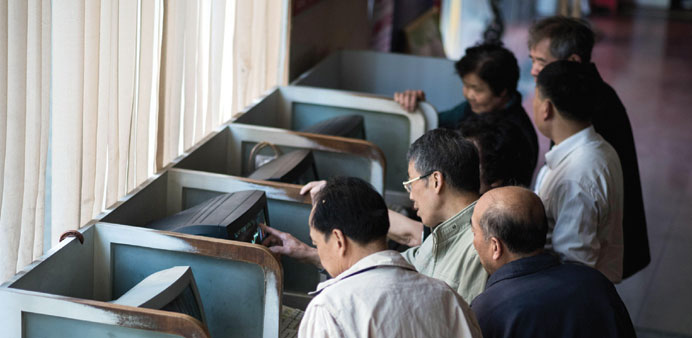Investors follow financial information at a securities brokerage in Shanghai. The Shanghai Composite climbed on the last trading session of the week, paring its loss and taking its two-day increase to more than 10%.
Bloomberg
London
Emerging-market assets rose on Friday as currencies averted a 10th weekly drop and stocks completed the biggest two-day rally since 2013, rebounding from a sell-off fuelled by concern over higher interest rates in the US and a slowdown in China.
The rouble extended its first weekly advance in 10 as the currency of the world’s biggest energy exporter climbed with crude oil, while the South African rand and Brazilian real fell in a rout exacerbated by China’s unexpected depreciation of the yuan on August 11. A 7.9% five-day loss in the Shanghai Composite Index was offset by gains in stock benchmarks from Mexico to Korea.
Financial markets have been convulsed by concerns over weaker Chinese growth, with as much as $8tn erased from the value of global equities since the move to weaken the country’s currency. Some investors speculate that the Fed won’t raise rates in September because of market developments.
“Volatility will stay high near-term, at least until the Fed meeting,” said Hertta Alava, who helps oversee the equivalent of about $395mn as the head of emerging markets at FIM Asset Management in Helsinki. “Weakness in EM currencies seems to continue and those countries which have a large current account deficit are most vulnerable.”
Emerging-market equities posted the first weekly advance in more than a month as investors searched for bargains amid speculation funds linked to the government in Beijing are buying equities. Policy makers want to stabilize shares before President Xi Jingping appears at a military parade next week to celebrate the 70th anniversary of the World War II victory over Japan, people familiar with the matter said. A 23% decline in emerging-market stocks from an April peak pushed valuations to an 18-month low before a rebound this week. Still, most investors are betting on gains fizzling out, with attention focused on the Fed. The Chinese rally will be short-lived because state intervention is too costly to continue and valuations are still not justified given the slowing economy, according to Bank of America Corp.
“China has its problems, lots of them, but they are by now priced into the market and they are well known to the investors,” Leopold Quell, a co-fund manager at Raiffeisen Capital Management in Vienna, said by e-mail. Stocks are “at attractive levels” after the sell-off, he said.
The MSCI Emerging Markets Index rose 0.9% to 820.25 in New York on Friday, widening its gain this week to 1% for the first five-day increase since July 17.
Developing-nation stocks tumbled on Monday before gaining 4.2% in the last two trading days. Even so, the stocks benchmark is poised for the biggest monthly loss since May 2012.
The Shanghai Composite climbed on the last trading session of the week, paring its loss and taking its two-day increase to more than 10%. The latest speculation about market intervention by China follows a halt to an unprecedented government effort to prop up equity prices that had prompted a debate among officials over the merits of such a programme.
The MSCI developing-nations measure is still down 6.6% since the yuan devaluation, with the price-to-earnings ratio for the next 12 months at 10.7 times, a 30% discount to the MSCI World Index of advanced-nation stocks.
Emerging-market currencies rose less than 0.1%, avoiding a 10th weekly drop that would have been the longest streak since the 1997 Asian financial crisis. Malaysia’s ringgit, among the worst-hit currencies in the meltdown 18 years ago, fell 0.7% for a 10th weekly decline.
The yuan climbed the most since March after the central bank boosted the currency’s reference rate in the biggest increase in five months.

